'Save the Sharks — Save the Oceans' ™ |
 |
|
|
Conservation & Education
 In March 2013 the Shark Research Committee will celebrate 50 years of Biological and Behavioral Research of the sharks indigenous to the Pacific Coast of North America. Our research objectives from inception have been multifaceted with public education, shark conservation and ecology, and the analysis of shark/human interactions our top priorities. It has been our goal to present the shark's crucial role in the marine ecosystem, and its interactions with humans, in a more realistic and scientific setting. In March 2013 the Shark Research Committee will celebrate 50 years of Biological and Behavioral Research of the sharks indigenous to the Pacific Coast of North America. Our research objectives from inception have been multifaceted with public education, shark conservation and ecology, and the analysis of shark/human interactions our top priorities. It has been our goal to present the shark's crucial role in the marine ecosystem, and its interactions with humans, in a more realistic and scientific setting.
 It is estimated that 70 to 100 Million sharks are killed annually, most for their 'prized fins.' The sharks are brought onboard ship, and usually while still alive, their fins are cut off and then they are summarily dropped back into the ocean. Alive, but without fins, they cannot swim or navigate, so they sink, ever so slowly into the black abyss of the oceans depths. Once on the ocean floor they lie, wrenching from side to side, trying to move forward, to irrigate their gills with life sustaining oxygen. Finally after hours, or in some cases maybe days, they die from asphyxiation. It is estimated that 70 to 100 Million sharks are killed annually, most for their 'prized fins.' The sharks are brought onboard ship, and usually while still alive, their fins are cut off and then they are summarily dropped back into the ocean. Alive, but without fins, they cannot swim or navigate, so they sink, ever so slowly into the black abyss of the oceans depths. Once on the ocean floor they lie, wrenching from side to side, trying to move forward, to irrigate their gills with life sustaining oxygen. Finally after hours, or in some cases maybe days, they die from asphyxiation.
 Sharks are slow growing and have litters with few young. Some sharks give live birth, some lay eggs. Some are carnivores and others survive on phytoplankton and zooplankton. Some sharks do not reach maturity until they are more than 10 years of age. But all fulfill an arduous task, keeping the Oceans healthy, while ensuring survival of their own species. As an Apex predator, sharks play a critical role in the ecosystems they inhabit. If you remove the sharks, populations of crustacean, fishes, and marine mammals could increase dramatically setting off a 'cascading' effect whereupon the entire ecosystem could collapse. Sharks are slow growing and have litters with few young. Some sharks give live birth, some lay eggs. Some are carnivores and others survive on phytoplankton and zooplankton. Some sharks do not reach maturity until they are more than 10 years of age. But all fulfill an arduous task, keeping the Oceans healthy, while ensuring survival of their own species. As an Apex predator, sharks play a critical role in the ecosystems they inhabit. If you remove the sharks, populations of crustacean, fishes, and marine mammals could increase dramatically setting off a 'cascading' effect whereupon the entire ecosystem could collapse.
 Shark fins are financially rewarding to the fishermen with one-pound of dried shark fins retailing for $300 US or more. It is a billion dollar industry that is widespread, and largely unmanaged and unmonitored. The annual senseless slaughter of sharks for their fins must stop immediately. In a report issued by the International Union for the Conservation of Nature, a third of the world's 64 species of pelagic sharks face extinction�....like the dinosaurs ......gone forever. Shark fins are financially rewarding to the fishermen with one-pound of dried shark fins retailing for $300 US or more. It is a billion dollar industry that is widespread, and largely unmanaged and unmonitored. The annual senseless slaughter of sharks for their fins must stop immediately. In a report issued by the International Union for the Conservation of Nature, a third of the world's 64 species of pelagic sharks face extinction�....like the dinosaurs ......gone forever.
Pledge your support today. The health and future of the World's Oceans, and their sharks, is in your hands. Make a commitment to support the Shark Research Committee's Conservation, Education, and Research programs. Please help 'Save the Sharks - Save the Oceans'.
If you would prefer,
you can mail your donation to;
| |
Shark Research Committee
Post Office Box 3492
Chatsworth, CA 91313 |
|
Your financial assistance will allow us to continue our public service and research programs, which include:
- Shark Conservation and Education
- Analysis of Shark Attacks Along the Pacific Coast of North America
- Pacific Coast Shark News (web site public service)
- Distribution of the White Shark along the Pacific Coast of North America through Satellite Tagging
- Predatory Behavior of the White Shark
- Functional Morphology of the White Shark
- Ecology of the White Shark along the Pacific Coast of North America
- Social Behavior of the White Shark
|
|


 In March 2013 the Shark Research Committee will celebrate 50 years of Biological and Behavioral Research of the sharks indigenous to the Pacific Coast of North America. Our research objectives from inception have been multifaceted with public education, shark conservation and ecology, and the analysis of shark/human interactions our top priorities. It has been our goal to present the shark's crucial role in the marine ecosystem, and its interactions with humans, in a more realistic and scientific setting.
In March 2013 the Shark Research Committee will celebrate 50 years of Biological and Behavioral Research of the sharks indigenous to the Pacific Coast of North America. Our research objectives from inception have been multifaceted with public education, shark conservation and ecology, and the analysis of shark/human interactions our top priorities. It has been our goal to present the shark's crucial role in the marine ecosystem, and its interactions with humans, in a more realistic and scientific setting.  It is estimated that 70 to 100 Million sharks are killed annually, most for their 'prized fins.' The sharks are brought onboard ship, and usually while still alive, their fins are cut off and then they are summarily dropped back into the ocean. Alive, but without fins, they cannot swim or navigate, so they sink, ever so slowly into the black abyss of the oceans depths. Once on the ocean floor they lie, wrenching from side to side, trying to move forward, to irrigate their gills with life sustaining oxygen. Finally after hours, or in some cases maybe days, they die from asphyxiation.
It is estimated that 70 to 100 Million sharks are killed annually, most for their 'prized fins.' The sharks are brought onboard ship, and usually while still alive, their fins are cut off and then they are summarily dropped back into the ocean. Alive, but without fins, they cannot swim or navigate, so they sink, ever so slowly into the black abyss of the oceans depths. Once on the ocean floor they lie, wrenching from side to side, trying to move forward, to irrigate their gills with life sustaining oxygen. Finally after hours, or in some cases maybe days, they die from asphyxiation.  Sharks are slow growing and have litters with few young. Some sharks give live birth, some lay eggs. Some are carnivores and others survive on phytoplankton and zooplankton. Some sharks do not reach maturity until they are more than 10 years of age. But all fulfill an arduous task, keeping the Oceans healthy, while ensuring survival of their own species. As an Apex predator, sharks play a critical role in the ecosystems they inhabit. If you remove the sharks, populations of crustacean, fishes, and marine mammals could increase dramatically setting off a 'cascading' effect whereupon the entire ecosystem could collapse.
Sharks are slow growing and have litters with few young. Some sharks give live birth, some lay eggs. Some are carnivores and others survive on phytoplankton and zooplankton. Some sharks do not reach maturity until they are more than 10 years of age. But all fulfill an arduous task, keeping the Oceans healthy, while ensuring survival of their own species. As an Apex predator, sharks play a critical role in the ecosystems they inhabit. If you remove the sharks, populations of crustacean, fishes, and marine mammals could increase dramatically setting off a 'cascading' effect whereupon the entire ecosystem could collapse.  Shark fins are financially rewarding to the fishermen with one-pound of dried shark fins retailing for $300 US or more. It is a billion dollar industry that is widespread, and largely unmanaged and unmonitored. The annual senseless slaughter of sharks for their fins must stop immediately. In a report issued by the International Union for the Conservation of Nature, a third of the world's 64 species of pelagic sharks face extinction�....like the dinosaurs ......gone forever.
Shark fins are financially rewarding to the fishermen with one-pound of dried shark fins retailing for $300 US or more. It is a billion dollar industry that is widespread, and largely unmanaged and unmonitored. The annual senseless slaughter of sharks for their fins must stop immediately. In a report issued by the International Union for the Conservation of Nature, a third of the world's 64 species of pelagic sharks face extinction�....like the dinosaurs ......gone forever.